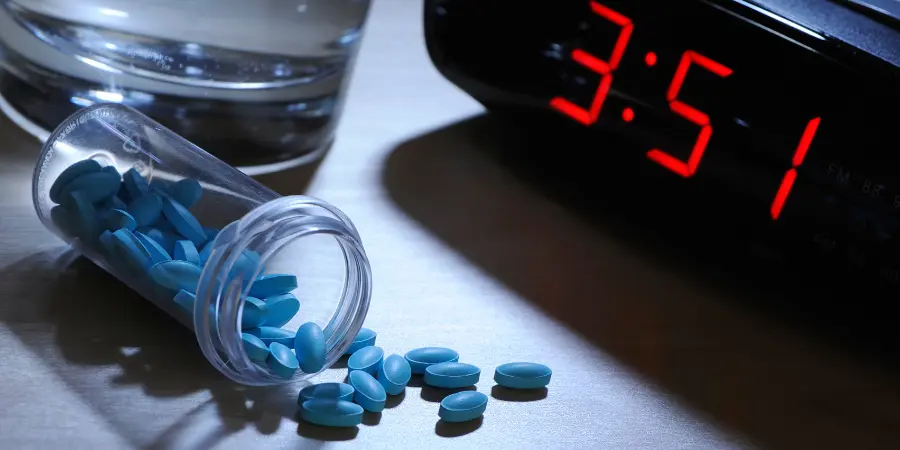
Written by:

Medically Reviewed by:
Last Updated:
February 18th, 2025
Sleeping Pill Addiction | Types, Symptoms and Effects
You may have, over time, heard people joke about popping a sleeping pill to help the time go by faster or to get past an experience. However, just like any other mind-altering drug, it is easy to fall into a pattern with sleeping pills which means any dependency you develop can go unnoticed, forming into a reliance on the drug both physically and emotionally. The damage you are incurring by taking sleeping pills so often may have continuous, even life-long consequences that involve risking sleeping pill addiction and all the side effects that come along with it.

What is sleeping pill addiction
Sleeping pill addiction occurs when your body adapts to the changes that sleeping pills form in the brain to such an extent that you develop withdrawal symptoms when you try to stop taking them. Sleeping pills consisting of benzodiazepines will usually attach to the GABA receptors in the brain and induce relaxation in their user, prompting them to sleep. This can pull you into a vicious cycle of increasing your dosage to counteract your body acclimatising to the effects, and is usually accompanied by an emotional reliance on the drug. The three main sleeping pill addictions include:
Zaleplon Addiction
Learn everything you need to know about addiction to zaleplon.
Zolpidem Addiction
Learn everything you need to know about addiction to zolpidem.
Zopiclone addicton
Learn everything you need to know about addiction to zopiclone.
How does sleeping pill addiction develop?
Sleeping pill addiction will usually occur after continuous use over an approximate frequency of just seven days or after taking a higher dosage of sleeping pills than needed or prescribed. Of course, this range will vary from person to person.
Addiction to sleeping pills, more often than not, stems from using sleeping pills as a coping mechanism. Factors such as anxiety or depression may cause short-lived relief. For that reason, seeking help for addiction to sleeping pills is the best option, as this deals with the underlying issue that caused you to seek out sleeping pills in the first place.
While it is best to take sleeping pills as prescribed, many users don’t opt for a professional recommendation and end up purchasing over-the-counter sleeping pills. These put you at the same risk of addiction as prescribed medication. Some sleeping pills, unfortunately, are habit-forming, and sleeping pill addiction is a growing problem in the UK. As well as accessing them through prescriptions, users can get from countless illicit sources including many sites on the dark web and from street dealers.
Symptoms of sleeping pill addiction
Along with cravings, you may find that you are experiencing some symptoms of addiction to sleeping pills that arise with dependency and abuse. You may experience these symptoms at a time when you abstain from taking the pills. However, it has been found that people who are addicted to sleeping pills may experience the symptoms below and feel tired and sleepy all day around rather than just at night-time.
- Drowsiness
- Confusion
- Memory loss
- Incoherent speech
- Hallucinations
- Mood swings
- Bad dreams
- Physical instability
Who can develop sleeping pill addiction?
Anybody can develop an addiction to sleeping pills, regardless of gender, age, race or socio-economic status. However, there are a few factors that may contribute addiction to sleeping pills, which can differ between different personalities and upbringing:
The health impact of sleeping pill addiction
Sleep is a simple pleasure that most people enjoy as a basic requirement and activity in everyday life. While sometimes you may be tempted to take sleeping pills to aid the quality of your sleep, the speed in which you fall asleep, or the duration of your sleep, remember that abuse and, resultantly, addiction to sleeping pills will cause adverse effects to your natural sleeping habits.
Addiction to sleeping pills and developing a dependency on them could cause you to lose your ability to sleep at your own free will, causing insomnia and other sleeping disorders as well as memory and concentration problems.
Seeking help for sleeping pill addiction
If any of the information in this page resonates with you, it is possible to overcome sleeping pill addiction with some hard work and perseverance. This can be very difficult to do alone and can be dangerous without professional assistance. At Primrose Lodge, we have a disciplined and supportive programme in place which includes a sleeping pill detox and a range of treatments at sleeping pill rehab to address both the physical and psychological sides of your addiction. As long as you are willing to make the change, we will always be here to offer the tools that helped us on our own recovery journeys. Contact us now to get started on your path toward a healthier, happier lifestyle!



